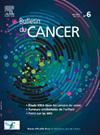Mise en place de l’oncologie gériatrique dans un hôpital isolé de Guyane française
IF 1.1
4区 医学
Q4 ONCOLOGY
引用次数: 0
Abstract
Introduction
L’objectif était d’analyser l’implantation du modèle de l’oncogériatrie dans un territoire isolé ultramarin : l’Ouest guyanais. La population est socialement précaire sur les plans des revenus, de la couverture sociale, du statut administratif, le plus souvent de langue non française et de culture non occidentale.
Méthodes
Description narrative de l’implantation et étude rétrospective des données anonymisées de la base de données des patients âgés pris en charge entre septembre 2014 et décembre 2020.
Résultats
Au total, 574 nouveaux patients ont été pris en charge. Parmi eux, 107 étaient âgés de 70 ans et plus ; 78 (73 %) ont eu un test G8. Quarante-deux patients ont eu une évaluation gériatrique multidimensionnelle. Plus de la moitié des patients présentaient des critères de dépendance, de malnutrition, avec un nombre de comorbidités sévères élevé. Les difficultés rencontrées ont été : la langue, le niveau d’éducation, le contexte clinique (chez dix-huit patients), mais aussi la participation insuffisante des soignants et les conséquences de l’organisation sanitaire et d’une implantation progressive.
Discussion
L’implantation a été impactée par le fait que les critères de qualité d’une mise en œuvre n’ont pas été suffisants. Des études, menées dans les pays à revenu moyen-haut d’Amérique du Sud, suggèrent que la réalisation initiale de l’évaluation gériatrique multidimensionnelle peut être préférable, que les tests de dépistage de la fragilité et la procédure de l’évaluation gériatrique multidimensionnelle peuvent être adaptés à des populations non occidentales, que l’utilisation de nouvelles technologies peut améliorer la prise en charge des patients âgés dans ce contexte.
Introduction
The aim was to analyze the implementation of the Onco-Geriatrics model in a remote ultramarine territory: West-French Guiana. The population is socially precarious in terms of income, social coverage and administrative status, and most often speaks a non-French language and has a non-Western culture.
Methods
Narrative description of the implementation and retrospective study of anonymized data from the database of older patients managed for cancer between September 2014 and December 2020.
Results
A total of 574 new patients were managed. Of these, 107 were aged 70 and over; 78 (73 %) had a G8 test. Forty-two patients had a multidimensional geriatric assessment (MGA). More than half the patients had dependency criteria, malnutrition and a high number of severe comorbidities. Difficulties encountered were language, level of education, clinical context (in 18 patients), but also insufficient involvement of health professional and the consequences of health organization and gradual implementation.
Discussion
Implementation was impacted by the fact that quality criteria for implementation were not sufficient. Studies in high-middle-income countries in South America suggest that initial implementation of the MGA may be preferable, that frailty screening tests and the MGA procedure can be adapted to non-Western populations, and that the use of new technologies can improve the management of older patients in this context.
[在法属圭亚那一家偏远医院实施老年肿瘤学]。
前言:目的是分析在遥远的海洋地区:西法属圭亚那实施老年肿瘤模型。在收入、社会覆盖面和行政地位方面,人口在社会上是不稳定的,而且大多数人说的不是法语,也没有西方文化。方法:对2014年9月至2020年12月期间接受癌症治疗的老年患者数据库中的匿名数据进行叙述性描述和回顾性研究。结果:共治疗新患者574例。其中,107人年龄在70岁及以上;78例(73%)进行了G8检测。42例患者进行了多维老年评估(MGA)。超过一半的患者有依赖标准、营养不良和大量严重的合并症。遇到的困难包括语言、教育水平、临床背景(18名患者),但也包括卫生专业人员参与不足以及卫生组织和逐步实施的后果。讨论:实施受到实施质量标准不充分这一事实的影响。在南美洲中高收入国家进行的研究表明,最初实施MGA可能更好,虚弱筛查试验和MGA程序可以适用于非西方人群,并且在这种情况下使用新技术可以改善老年患者的管理。
本文章由计算机程序翻译,如有差异,请以英文原文为准。
求助全文
约1分钟内获得全文
求助全文
来源期刊

Bulletin Du Cancer
医学-肿瘤学
CiteScore
1.90
自引率
16.70%
发文量
224
审稿时长
37 days
期刊介绍:
Without doubt, the ''Bulletin du Cancer'' is the French language publication of reference in the field of cancerology. Official organ of the French Society of Cancer, this journal covers all the information available, whether in the form of original articles or review articles, but also clinical cases and letters to the editor, including various disciplines as onco-hematology, solids tumors, medical oncology, pharmacology, epidemiology, biology as well as fundamental research in cancerology. The journal proposes a clinical and therapeutic approach of high scientific standard and regular updates in knowledge are thus made possible. Articles can be submitted in French or English.
 求助内容:
求助内容: 应助结果提醒方式:
应助结果提醒方式:


